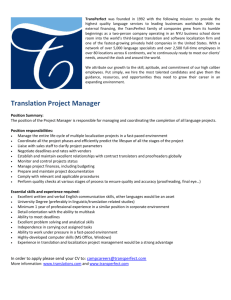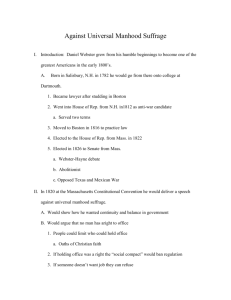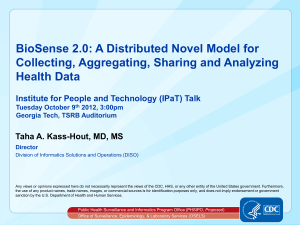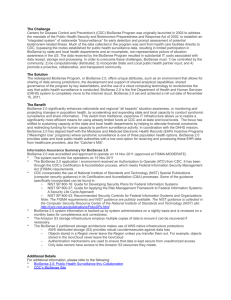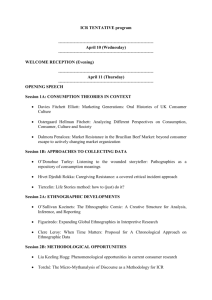Case Study – Biosense Webster / Innovating a - Net
advertisement
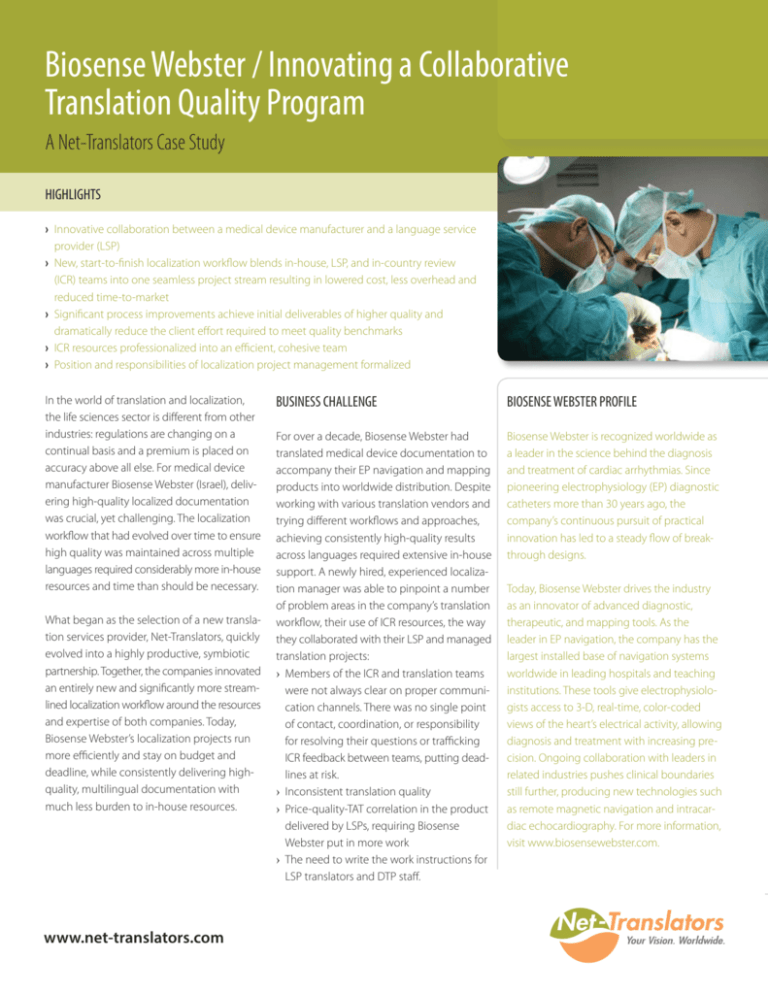
Biosense Webster / Innovating a Collaborative Translation Quality Program A Net-Translators Case Study HIGHLIGHTS › Innovative collaboration between a medical device manufacturer and a language service provider (LSP) › New, start-to-finish localization workflow blends in-house, LSP, and in-country review (ICR) teams into one seamless project stream resulting in lowered cost, less overhead and reduced time-to-market › Significant process improvements achieve initial deliverables of higher quality and dramatically reduce the client effort required to meet quality benchmarks › ICR resources professionalized into an efficient, cohesive team › Position and responsibilities of localization project management formalized In the world of translation and localization, the life sciences sector is different from other industries: regulations are changing on a continual basis and a premium is placed on accuracy above all else. For medical device manufacturer Biosense Webster (Israel), delivering high-quality localized documentation was crucial, yet challenging. The localization workflow that had evolved over time to ensure high quality was maintained across multiple languages required considerably more in-house resources and time than should be necessary. What began as the selection of a new translation services provider, Net-Translators, quickly evolved into a highly productive, symbiotic partnership. Together, the companies innovated an entirely new and significantly more streamlined localization workflow around the resources and expertise of both companies. Today, Biosense Webster’s localization projects run more efficiently and stay on budget and deadline, while consistently delivering highquality, multilingual documentation with much less burden to in-house resources. www.net-translators.com BUSINESS CHALLENGE BIOSENSE WEBSTER PROFILE For over a decade, Biosense Webster had translated medical device documentation to accompany their EP navigation and mapping products into worldwide distribution. Despite working with various translation vendors and trying different workflows and approaches, achieving consistently high-quality results across languages required extensive in-house support. A newly hired, experienced localization manager was able to pinpoint a number of problem areas in the company’s translation workflow, their use of ICR resources, the way they collaborated with their LSP and managed translation projects: › Members of the ICR and translation teams were not always clear on proper communication channels. There was no single point of contact, coordination, or responsibility for resolving their questions or trafficking ICR feedback between teams, putting deadlines at risk. › Inconsistent translation quality › Price-quality-TAT correlation in the product delivered by LSPs, requiring Biosense Webster put in more work › The need to write the work instructions for LSP translators and DTP staff. Biosense Webster is recognized worldwide as a leader in the science behind the diagnosis and treatment of cardiac arrhythmias. Since pioneering electrophysiology (EP) diagnostic catheters more than 30 years ago, the company’s continuous pursuit of practical innovation has led to a steady flow of breakthrough designs. Today, Biosense Webster drives the industry as an innovator of advanced diagnostic, therapeutic, and mapping tools. As the leader in EP navigation, the company has the largest installed base of navigation systems worldwide in leading hospitals and teaching institutions. These tools give electrophysiologists access to 3-D, real-time, color-coded views of the heart’s electrical activity, allowing diagnosis and treatment with increasing precision. Ongoing collaboration with leaders in related industries pushes clinical boundaries still further, producing new technologies such as remote magnetic navigation and intracardiac echocardiography. For more information, visit www.biosensewebster.com. A Net-Translators Case Study Biosense Webster: Innovating a Collaborative Translation Quality Program BUSINESS SOLUTIONS “ Net-Translators worked in concert with our inhouse quality management in such a manner that you didn’t know where one left off and the other began. It really gave me the peace of mind that they care as much about quality as we — a medical device manufacturer — do. Besides the good quality and great attitude, they don’t just listen, they actually hear you. ” Alex Lik, Localization Manager, Biosense Webster Israel Even with key workflow issues identified, the complexities and interrelationships of these problems and the number of different teams involved made it inefficient to resolve them one at a time. Biosense Webster began by selecting a new translation vendor. New LSP selected At the end of an extensive selection process, LSP Net-Translators was chosen, in large part, because their focus on standard localization processes, structured approach to quality, and expertise in medical-device localization resonated with Biosense Webster’s needs, challenges, and quality expectations. Net-Translators quickly became more of a partner, collaborating with Biosense Webster to innovate unique solutions to the translation inefficiency problems they were experiencing. Net-Translators diverse experience working with many companies in the medical-device and other industries brought an infusion of new ideas and proven techniques for resolving workflow inefficiencies and trimming cost without sacrificing quality. Their worldwide footprint includes availability in every time zone, a bonus when the project team is spread around the world. And although Net-Translators obtained ISO 13485 certification after the formal vendor selection process was complete, it served to validate Biosense Webster’s choice of Net-Translators as it effectively integrated both quality systems in use at Biosense Webster. ICR formalized and professionalized by Biosense Webster Next, Biosense Webster began to make changes to the way their ICR program was managed, staffed, and run. › ICR is now a formal job responsibility Biosense Webster’s ICR resources are in-country employees spread around the globe. Previously, the task of ICR was not typically part of their job description, it was performed on top of existing job duties making turnaround and, thus, meeting localization deadlines, inherently unpredictable. ICR is now formally incorporated into each reviewer’s job description, increasing predictability and reducing project management efforts needed to schedule ICR resources and revise project schedules. › Reviewers are pre-screened and trained Going forward, it was important to ensure that both existing reviewers and those hired in the future were qualified for this task, specifically for translation review. To ensure every reviewer has the needed language background, regulatory knowledge, interpersonal skills, and availability, Biosense Webster worked together with Net-Translators to develop a recommended skills checklist for ICR resources. The list is now used by Biosense Webster when interviewing for positions that include ICR. Biosense Webster also developed a formal training program which is now required for all ICR resources. › New ICR operational guidelines and tools Biosense Webster’s operational ICR instructions consisted of a two-page guideline, leaving reviewers with considerable leeway to interpret what was needed and expected during ICR. Consequently, feedback was at times inconsistent and not always useful. In addition, reviewers used the available tools of their choice to review translations and provide feedback; no standard tools were required. The result was feedback in disparate formats and styles ranging from highly detailed and valuable to unfocused comments. For feedback recipients, coordinating and triaging this feedback was tedious and highly inefficient. A new, more comprehensive set of operational ICR guidelines was developed to make the ICR task as clear, consistent, and efficient as possible for both reviewers and project management. The guidelines formalized the definition of what is sent for ICR and when, the role of the reviewer and scope of their task, the tools to be used, and methodologies for markup, reporting, approvals, file exchange, and more. Familiarity with a new set of procedures required a little time investment upfront, but ultimately streamlined the jobs of everyone. Through these changes, the task of ICR at Biosense Webster was essentially professionalized: ICR is part of each reviewer’s job, reviewers now have a clear scope, the necessary skill set, consistent tools, and comprehensive, uniform operational guidelines. Today, ICR teams, management of ICR resources and handling ICR feedback are measurably more efficient and predictable. ICR team members are also more motivated and more accountable for the quality of the feedback they provide. Localization project management formalized Until the recent hiring of a full-time localization manager, Biosense Webster had no single point-of-contact for documentation localization projects. The job of managing and scheduling the ICR team, coordinating the timing and flow of feedback and information between ICR, content owners, and the translation vendor, and resolving miscommunications that arose between these various teams was not a centralized task or dedicated to one person. For the various staff (who had other job responsibilities) tasked to oversee ICR during an active localization project, managing a group of over 70 reviewers scattered throughout the world was tedious and time consuming. It also made it hard for management to get clear, reliable localization project status or troubleshoot accountability when deadline issues arose. are now involved earlier in the initial review and approvals of project terminology. Their sign-off is required before the project moves forward, helping to establish a solid, accurate baseline of terms early before they are used by translators. These changes eliminated many cycles of ICR that were necessary and common in the old workflow. Localization project management was formalized into a professional position requiring localization experience. This position acts as an internal project manager, providing a single, clear point of contact and responsibility for both management and other internal groups. It also takes point on communication and project traffic with ICR and LSP teams, including managing feedback: filtering out irrelevant comments, resolving non-linguistic issues, and shepherding priority issues to the appropriate teams for resolution. › Ongoing QA & quality metrics in place Net-Translators uses an adaptive QA model developed in-house and based upon industry-standard metrics. The model allows each client to set baseline and thresholds required for their industry and/or standards. It was adapted to Biosense Webster’s workflow and quality expectations; metrics collected are used to monitor and refine quality on an ongoing basis, track trends that help to maximize cost efficiencies, and drive future process refinements. Today, Biosense Webster has considerably more visibility into the inner workings of the entire localization workflow and is able to make ongoing refinements to the localization process, tools, and resources to meet challenges as they arise. Workflow streamlined With a new quality-focused LSP in place, a trained, professionalized ICR team deployed, and a localization project manager at the helm, it now became possible to optimize a more efficient, more streamlined project workflow that seamlessly integrates members from client and LSP teams. Some tasks formerly handled by Biosense Webster could now be offloaded to Net-Translators, raising efficiency even further. Overall, fewer steps and fewer cycles are now required to achieve high-quality results more predictably, with huge cost efficiencies, and with the same or tighter deadlines. Notable workflow changes include: › Handling glossary & termbase updates Today, before translation begins, Net-Translators drives creation of the glossary and update of the termbase with new terminology for each project, offloading the Biosense Webster project manager of this task. On the client side, the ICR resources › Translation QA streamlined The translation QA process was also streamlined. Team members on both client and LSP sides were integrated into a single, more efficient project stream, erasing the traditional boundaries between in-house and outsourced LSP teams. › Web portal simplifies project administration Net-Translators provides a secure web portal for project procurement and communications for all clients. The portal has helped Biosense Webster simplify project administration and reduce the time required for procurement and monitoring. A Net-Translators Case Study Biosense Webster: Innovating a Collaborative Translation Quality Program In the new, streamlined workflow, each team member knows their role, the timelines, and the deliverables, and has guidelines, tools, and open communications channels they need to work efficiently with their peers on both teams. To Biosense Webster, Net-Translators “feels” like their in-house language services unit. Today, a typical translation project requires only one ICR pass and achieves better translation acceptance. On the surface, this is not a story of innovation. Net-Translators has helped many companies tailor highly efficient localization workflows to meet the strategic goals of high quality, reduced time to market, and exceptional customer satisfaction. With the help of a quality-focused, collaboration-minded LSP, any company can affect these kinds of changes to their localization workflow and impacts to their bottom line. RESULTS ABOUT NET-TRANSLATORS In Net-Translators, Biosense Webster found a partner who faces the rigorous localizationquality and accuracy demands of the medical device industry as if they were their own and who cares as much about quality as they do. Unlike many translation companies, where the process of localization operates start-to-finish like a “black box,” Net-Translators helped Biosense Webster innovate a symbiotic localization workflow and gave them more visibility into and control over the general process of translation management. Today, Biosense Webster produces high-quality localized documentation in all languages with significantly higher operational efficiencies, reduced in-house effort, consistently met deadlines, and reduced time-to-market and costs. Net-Translators is a leading provider of translation, localization, and multilingual testing services in more than 60 languages. For over a decade, they have helped medical device manufacturers, software developers, and hardware companies prepare their products and services for worldwide deployment. ISO 13485:2003 quality management systems for medical devices certification guarantees that services are performed in compliance with the exceptionally rigid requirements set by this international quality standard. ISO 9001:2008 quality management systems certification also ensures compliance with quality management systems in procedures not specific to medical applications. Compliance with the EN 15038:2006 quality standard, a growing requirement for companies throughout Europe, demonstrates a commitment to providing translation services of the highest quality and gives prospective clients a reliable and easy way to assess service quality. Net-Translators has earned the trust of market leaders in every industry they serve. They have an extraordinarily high percentage of repeat customers representing a wide range of companies including GE Healthcare, NetApp, and others. Net-Translators works together with each company to tailor a complete solution that includes the planning, services, and guidance each client needs to shepherd their products from source language readiness through worldwide launch. Net-Translators’ one-of-a-kind Multilingual QA Center offers multilingual testing in over 30 languages under one roof. This state-of-theart facility houses a flexible IT environment built for testing support and a highly collaborative QA team that includes professional testers and QA managers, developers, designers, linguists, and webmasters, all working together to solve problems across languages. For more information, visit www.net-translators.com Biosense Webster is a trademark of Biosense Webster, Inc. www.net-translators.com USA (East) USA (West) Argentina UK Israel salesuseast@net-translators.com salesusca@net-translators.com salessoutham@net-translators.com saleseu@net-translators.com salesil@net-translators.com
